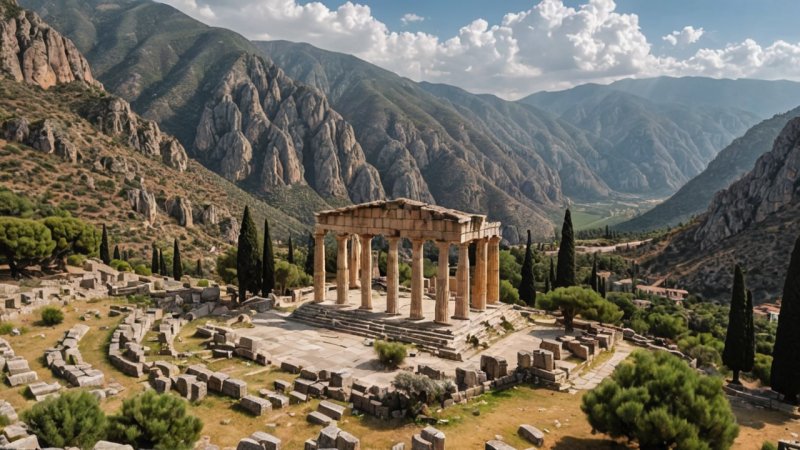The Temple of Apollo, located in Delphi, Greece, is one of the most significant ancient sanctuaries in the world, revered for its historical, cultural, and architectural significance. Dedicated to the god Apollo, this sacred site was the center of the ancient world, where people from all over came to seek wisdom, guidance, and prophecy from the Oracle. In this article, we will explore the key highlights, travel tips, and unique experiences that make a visit to the Temple of Apollo an unforgettable journey through history.
1. Rich Historical Background
The Temple of Apollo has a rich history that dates back to the 4th century BCE. It was built on the site of an earlier temple that was destroyed by fire. The sanctuary was a major cultural and religious center in ancient Greece and played a pivotal role in the development of Greek civilization. As the home of the famous Oracle of Delphi, visitors would come from far and wide to consult the Pythia, the priestess who delivered cryptic prophecies. Understanding this historical backdrop enhances the experience of visiting the temple, as you can appreciate the significance it held in ancient society.
2. Architectural Marvel
One of the standout features of the Temple of Apollo is its stunning architecture. The temple was designed in the Doric style, characterized by its simple yet elegant columns. Originally, it featured 6 columns at the front and 15 along the sides, creating a grand entrance that has captivated visitors for centuries. The ruins you see today, while weathered, still showcase the impressive craftsmanship of ancient Greek builders. Take a moment to wander around the site and admire the details of the remaining structures, including the beautiful friezes that depict scenes from mythology.
3. The Oracle of Delphi
The Oracle of Delphi is perhaps the most famous aspect of the Temple of Apollo. The Pythia, the oracle, would enter a trance-like state and deliver prophecies that were often open to interpretation. These prophecies influenced various aspects of Greek life, including politics, warfare, and personal decisions. When visiting, be sure to visit the nearby museum, which houses artifacts and inscriptions related to the oracle's predictions. Engaging with these historical elements can give you a deeper understanding of the influence the Oracle held over ancient and even modern civilizations.
4. Breathtaking Surroundings
The Temple of Apollo is not only remarkable for its historical and architectural significance but also for its stunning natural surroundings. Nestled on the slopes of Mount Parnassus, the temple offers breathtaking views of the valley below. The landscape is dotted with olive groves and cypress trees, creating a serene atmosphere that enhances the spiritual experience of the site. Bring your camera to capture the beauty of the scenery, and consider taking a hike in the surrounding areas to fully immerse yourself in the natural beauty of Delphi.
5. Practical Travel Tips
When planning your visit to the Temple of Apollo, there are several practical tips to keep in mind. First, the best time to visit is during the spring or fall when the weather is mild and the crowds are smaller. Make sure to wear comfortable shoes, as the site involves some walking and uneven terrain. Additionally, consider purchasing a combined ticket that includes access to the archaeological site and the Delphi Archaeological Museum for a comprehensive experience. Lastly, take the time to explore the quaint village of Delphi, where you can enjoy local cuisine and shop for traditional Greek souvenirs.
In conclusion, the Temple of Apollo is an awe-inspiring destination that offers a unique glimpse into the ancient world. Whether you're captivated by the rich history, the architectural beauty, or the breathtaking surroundings, a visit to this historic landmark is sure to leave a lasting impression. By immersing yourself in the stories of the Oracle, admiring the craftsmanship of ancient builders, and enjoying the stunning scenery, you will not only deepen your appreciation for Greek heritage but also create memories that will last a lifetime.






